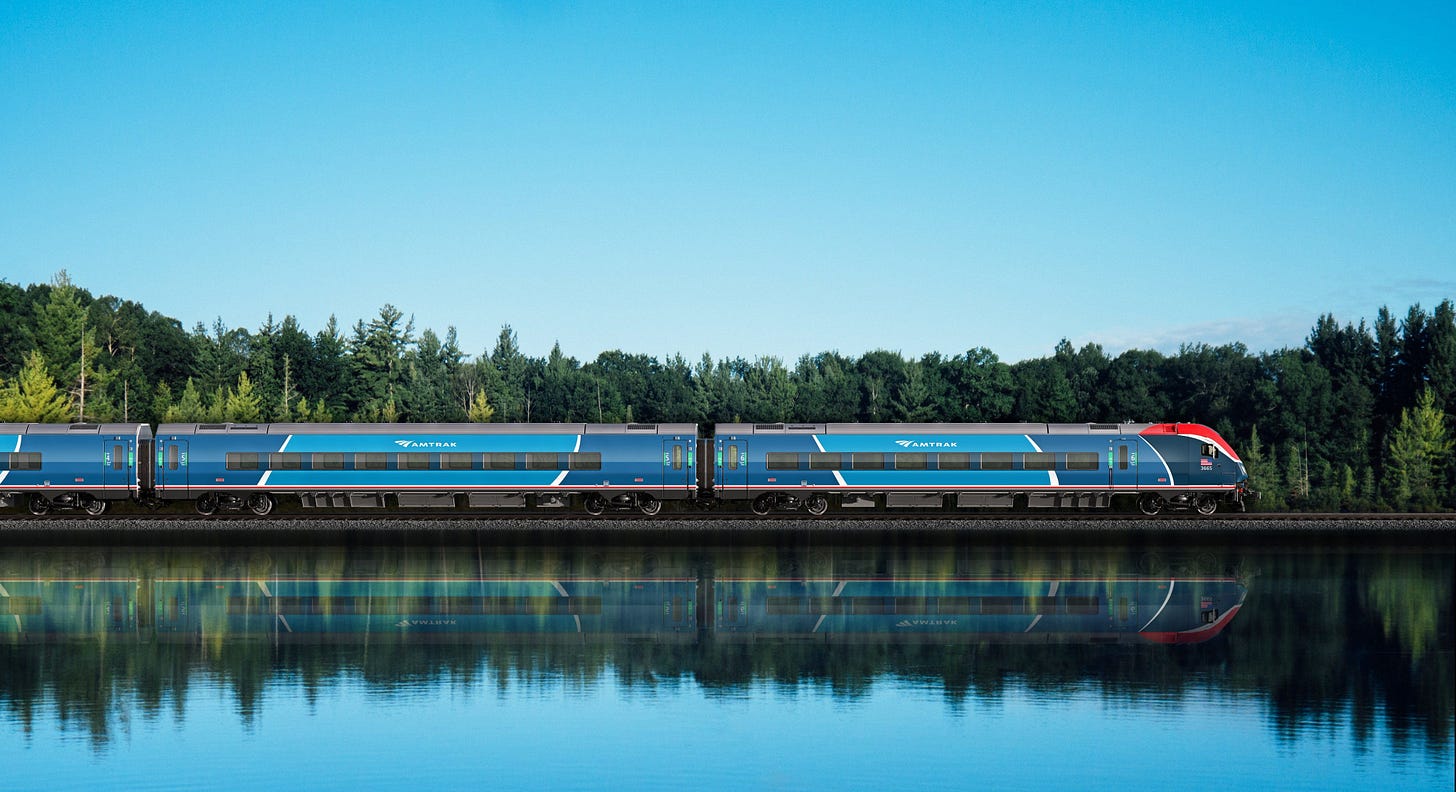Maybe your next flight should be on a train
The uphill battle of passenger rail.

In the U.S., train travel is dismally underfunded and, therefore, underused. With much of the country unserviced by timely and convenient train schedules, cars are default for just about anywhere — and planes will get you further than anywhere.
Despite best efforts by Amtrak — the federally run passenger rail system in the U.S. — it’s not even close to competing with airlines:
Last year, U.S. airlines carried 751 million passengers (domestically), compared to Amtrak’s 9.2 million.
Put another way, U.S. airlines need only four and a half days to surpass Amtrak’s total passengers for the entire year.
That’s a problem in a warming world, as planes emit about five times more greenhouse gases than trains. And unlike other parts of modern society, like electricity generation, airlines are not easily made green.
As the number of flights continues to increase, the airline industry — which already accounts for 2.5% of global emissions — could eat up much of the Planet’s remaining carbon budget.
So if tech fixes aren’t readily available, we must rethink how we tackle this carbon conundrum. In this case, it may simply be turning to a solution that already exists: the humble train.
Several recent initiatives in Europe may offer helpful models for getting people off planes and onto trains:
France banned all short-haul flights, where the same journey could be made in under two-and-a-half hours by train.
Austria straight-up canceled its 50-minute flight between Vienna and Salzburg, which is serviced by a three-hour train.
Germany slashed the price of public transit tickets (though the initiative focused on commuters, the same could be applied to longer routes).
These fixes will help push people toward trains, but the longer-term challenge is correcting misplaced incentives: Governments have traditionally subsidized airlines while underfunding rail lines.
This is reflected in the prices of airplane v. train tickets. Greenpeace recently analyzed 112 routes in Europe, finding that 79 are serviced by flights that are cheaper than rail. On average, rail trips were twice as expensive as flights.
The U.S. faces a similar problem after decades of prioritizing highways and runways. Such prioritization has actually slowed down trains (a train ride from New York to Chicago takes longer than it did 75 years ago), while cratering any legitimate hopes for transformational technologies, like high-speed bullet trains.
It’s a fool’s errand to apply every European solution to the U.S., but generally, transportation should be universal enough to offer a valuable perspective. To get more people on trains, we’ll need both carrots (slashed train ticket prices, increased rail service) and sticks (increased tolls and taxes on cars and planes that better reflect their climate impact).
But we’ll also need a cultural shift, something I’m regrettably skeptical of. That’s mostly because certain ideals are so ingrained in culture, or so prone to stubborn American mantras, that to buck the status quo is not only unsuccessful — it’s counterproductive, ostracizing the very audience we’re speaking to.
Feeling ostracized, people lash out against seemingly nonpolitical issues. And I’d hate for train travel to be politicized like meat, renewable energy, or even gas stoves, framed as another liberal ideal for conservatives to attack.
Thankfully, train travel has largely avoided being subject to full-blown culture clashes, but that’s because it hasn’t realistically been pitted against cars or planes.
So instead of launching a culture war on cars or planes, we must make trains so irresistible, so efficient, so affordable, so sensible, that to ignore them would be more than stubborn — it would be stupid.
Maybe frame it this way: Next time you’re in sitting traffic, stuck at the TSA security checkpoint, or calling a $40 Uber from the airport, think of how nice it would be to cozy up with a book and a window seat on a train.
To some, that is smart traveling. To me, it is bliss.


I see an added challenge in the fact that the US is so damn BIG that you simply can't get anywhere fast without flying. I live in the Midwest (in a city that, like hundreds of other cities in the Midwest, is stuck between big and small, neither a rural town nor a thriving metropolis) and thus the nearest Amtrak station is a whopping 3.5 hours away by car. I haven't had the luxury of travel by train for this reason, but it is definitely on my bucket list!
The price of public transport in England has definitely seemed to rise recently, but even more is people opinion's on cars. I feel i meet so many more people now who will drive such short distances because it's 'easier' (lazier). Brandon's point about the mindset change really is a massive part of the puzzle.